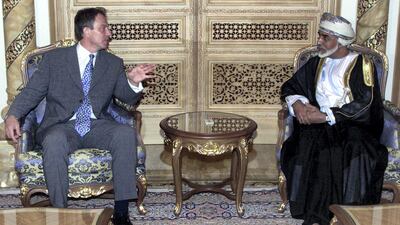I knew Sultan Qaboos for more than 20 years. I visited Oman many times and frequently sat and talked with him into the late hours.
The dinners he held were legendary. Over time, from my beginning as the novice westerner I was – when I first came to see him – I grew to appreciate them and him. But it was an education in a different dinner etiquette. I was brought up to clean my plate of whatever food was put on it. I recall the initial dinner when – after three courses that I had all dutifully devoured, and was feeling very full – I asked how many more and was told 20. He took pity on me and informed me with some amusement that I really did not have to finish everything.
The first thing that stood out about him was his humanity. He did not seek the leadership of his country through personal ambition but because, even though a very young man at the time, he could see his nation’s future blocked by outdated thinking and a narrow view of the world, which was inhibiting its development.
He believed in his people, in their unique qualities and in their potential but could see little hope of exploiting that potential without change. As the development of the country proceeded, that same humane commitment made him want Oman to be a centre of tolerance, diversity and culture. He was the very opposite of narrow-minded but open-minded across boundaries of race, faith and culture. He loved art and music and though a devout Muslim, was completely at home with those of different religions.
Secondly, he knew the key to development was opening up the economy. He encouraged tourism, improved the infrastructure of the country radically, oversaw a rapid expansion of education and health facilities and at the time of his death, was embarked upon a very necessary diversification of the economy.
He often used to tell me that his overwhelming anxiety was that the instability of the region and the tensions between critical regional players should put at risk Oman’s development. He would take me outside the room we were in, point across the sea towards Iran and say: "You see this short distance, that is why we cannot afford conflict."
So thirdly, he fiercely protected his country’s independence so that it could play the role of mediator and peace maker where possible. Oman became a place where meetings of extreme sensitivity could be held with full confidence, where those at odds with each other could be reconciled, and where with a gentle and calm disposition, he would explore opportunities for co-operation.
When we look at the Oman he took over, and the Oman of today, there is no doubt that Sultan Qaboos deserves the eulogies bestowed on him virtually from round the globe.
This was partially based on his achievements but also on the warmth and kindness of his personality. For a leader and a monarch to boot, he was remarkably lacking in ego. This showed itself in the manner of the succession planning. The sealed envelope with his chosen successor, remained sealed and silent until his death, when it was opened and immediately given effect to. This demonstrates the respect in which he was held.
The new leader – Sultan Haitham – was also wisely chosen. The challenge of Oman continues to be development, diversifying the economy much further, improving the quality of human capital, ensuring the country can take advantage of, and play a part in the technological revolution sweeping all the world, so that its young and ambitious population has an optimistic hope for the future.
The new ruler has both the experience and inclination to follow that path of reform. Oil prices will stay volatile, high debt and dependence on external financing can be a drag anchor on growth. And so the economic enabling, which Sultan Qaboos began, will have to be deepened and entrenched.
But the friends of Oman are hopeful. An extraordinary foundation has been laid. For that and for much more, we have cause to be grateful to Sultan Qaboos.
Tony Blair was prime minister of the UK from 1997 to 2007



















